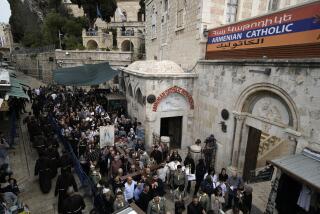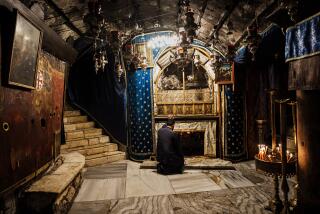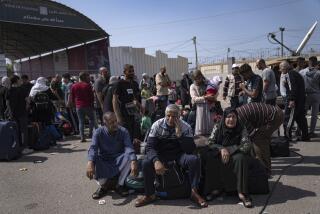Egypt’s wary Christians
- Share via
Muslims and Christians in Egypt made common cause in agitating for the overthrow of President Hosni Mubarak, but the alliance is fraying. A report by The Times’ Jeffrey Fleishman about the country’s Coptic Christians — 10% of the population — suggests that they are developing painful second thoughts about the “Arab Spring” now that Islamist parties are in the ascendance.
Like other Egyptians, Copts believe that the Supreme Council of the Armed Forces, which took control after Mubarak was deposed, has overstayed its welcome. But even the military is viewed as more welcoming of Christians than the Islamic parties that have dominated the first phase of parliamentary elections. In recent days, some strident voices have called openly for a strict Islamic state. A popular preacher was dismissive of protection for minorities. “The Crusader Christians are a minority and we can never equate a minority’s rights with the majority’s,” said Wagdi Ghoneim. “How can they ask for the same rights as ours?”
It is unclear how influential such voices are. The Muslim Brotherhood, whose party led in the first round of the elections, has been conciliatory toward Christians. A government in which it played the leading role could emphasize its Islamic roots without oppressing or marginalizing Christians. Or perhaps it wouldn’t. There is no guarantee that, once in power, the Brotherhood would abide by its assurances.
Clearly Egypt will have to resolve the tension that is already evident between electoral democracy and pluralism. Its international credibility will depend to some extent on the degree to which it abides by international norms of religious freedom. But it is also in Egypt’s domestic interest to protect Christians. Although many Egyptian Christians are impoverished, others — former United Nations Secretary-General Boutros Boutros-Ghali is an example — are highly educated and affluent and have played leading roles in Egypt’s political and commercial life. Egypt would be poorer without them.
Laws that further institutionalized Islam also would speed the departure from Egypt of those Copts who have the means to relocate. The exodus of Christians from the Middle East, the cradle of their religion, is a sadly familiar story. From the West Bank to Lebanon to Iraq, they have left because of political instability, violence or discrimination. Sometimes they are refugees within their own countries. In 2008 more than 1,300 Iraqi Christians fled the city of Mosul after 14 were killed. Even when Christians stay — as the vast majority of Copts most likely would — their influence and well-being can suffer under an intolerant regime. That shouldn’t happen in post-revolutionary Egypt.
More to Read
A cure for the common opinion
Get thought-provoking perspectives with our weekly newsletter.
You may occasionally receive promotional content from the Los Angeles Times.






